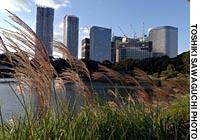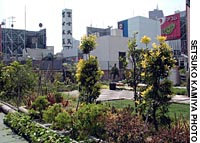Peter Berg is singularly passionate about his vision for a better world. He is convinced that towns and cities can move beyond the limitations of environmentalism and create vibrant communities that are economically and ecologically sustainable, and he believes bioregions are the key.
A bioregion is a human cultural concept, but it is not human-centered, Berg explained during a recent interview. Rather, it provides a paradigm for rediscovering, revitalizing and conserving both human life and the natural systems upon which human communities depend.
"The bioregional idea is different from environmentalism in several regards," Berg began, "but the main one is that it is based on the idea of preserving wild nature in the places that people live. The bioregional approach looks at each place, its unique natural features, such as climate, land forms, watershed, soil, native plants and animals, and seeks ways of human interaction with these features that are sustainable.
"People are part of the bioregion, and it's an attempt to put people back into ecology. This ecology that people inhabit is the place where they live and its wild natural systems," Berg said.
Berg is keenly aware that the bioregion idea can be misunderstood by those suspicious of environmentalists.
"I'm not trying to get people in cities to sleep with bears. I'm trying to restore natural systems, because ultimately we depend on them: we eat food that comes from soil, we need water, we create sewage, we do all these things that have an enormous impact on where we live, so we should be harmonizing with that environment -- and when you see the birds come back and you see the animals come back, it's a sign that you're moving in the right direction," he explained.
Berg, 67, is director of the Planet Drum Foundation, an organization based in San Francisco that promotes bioregional education, sustainability and culture.
Two primary goals
The bioregional approach has two primary goals. The first is to restore and maintain natural systems, like watersheds, soils, native plants and animals. The second is to find sustainable ways to satisfy basic human needs while preserving the natural systems upon which all human communities depend.
So what can be done with a city like Tokyo? Are there ways to reinvent urban areas that have been encased in concrete?
"We call it 'reinhabit,' which means exactly that, and yes, all cities are within bioregions," Berg explained. "Tokyo is on the Kanto Plain facing Tokyo Bay, which means there are watersheds, landforms, ocean influences, and climate.
"In Tokyo, the bioregion is a bit submerged by human artifact, but there is no reason for it to be submerged from consciousness, and decisions can be made about the future, such as linking up parks to create wild corridors," he added.
According to Berg, the term bioregion comes from 19th-century German naturalism. In the 1970s, he and Raymond F. Dasmann, one of America's ecology luminaries, adopted the term to mean the continuity of natural features within a certain geographic area, and the adaptive ways people would have and would need to live with those features.
Berg's quest is to help towns and cities rediscover the natural ecosystems that underpin their communities. We can either embrace these vital support systems and work within their limitations, he believes, or ignore and degrade them, forcing us to haul resources from distant shores -- until those resources, too, are exhausted.
"We must find a way to re-balance human needs and human society with the biosphere. The key is restoring and maintaining natural systems and finding sustainable ways to provide for basic human needs," he said.
Berg is adamant that every city should have a small-business incubator program that supports the development of sustainability-oriented enterprises, for example start-up companies that make park benches out of construction waste or install water reuse systems. Incubator programs, funded by local governments, can provide grants, loans and work space to help entrepreneurs develop environmentally friendly, urban-based sustainable businesses.
"There are actually a lot of jobs in this," Berg pointed out. "A progressive mayor who wants to give the local economy a shot in the arm can write a prescription for the city's economy, and provide jobs for people who are unemployed or who don't like the jobs they have now."
Talking with Berg, it is clear that he loves Japan and he visits frequently. Asked what Japan can do to promote sustainability, he is quick with suggestions.
"I believe there should be a New Edo Period, one of sustainability and appreciation of nature," he said. "First, Japan can start in schools by reintroducing the grandeur of Japanese nature philosophy, meditation and art. Second, I would encourage environmental studies, local bioregional studies in schools, to revive appreciation of local natural systems.
"The next thing would be for governmental units to adopt sustainability policies within the natural systems of the places they are located. That's not so hard, and a good place to start is the UN Green Cities Declaration recently signed in San Francisco. Every city should be aware of this declaration, and citizens should demand that their cities go at least this far," he urged.
So far, however, Japanese authorities are steering clear of the declaration, apparently because its goals are too specific.
Japan unable to sign
According to Berg's colleagues in Japan, Tokyo did not send a delegation to San Francisco because it could not sign a document that calls on all signatories to "establish a policy to achieve zero waste to landfills and incinerators by 2040." Tokyo incinerates more than 75 percent of its waste.
I asked Berg how people across the world are responding to his bioregion message.
"People find it very hopeful, that there is a way to live sustainably and have governments and agencies become involved in a sustainability-oriented future, because they know that environmentalism has had a very superficial approach," he explained.
"If you value sustainability, then you're proud to see a certain level of wildlife return. That becomes part of your value system. If your children are optimistic about the future, and optimistic about their place in the natural community, that's an accomplishment of the society. It's not hard to see these as being replacement values for 'new,' 'modern' and 'money' -- because they really work," he said.




















With your current subscription plan you can comment on stories. However, before writing your first comment, please create a display name in the Profile section of your subscriber account page.